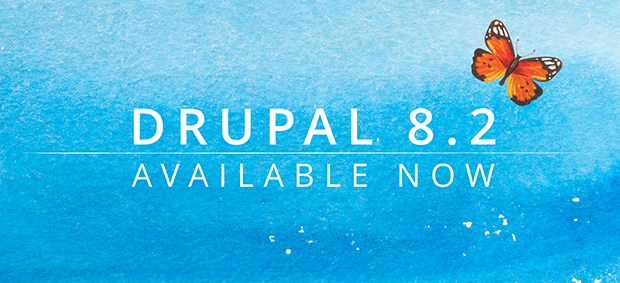 Support for Drupal 7 is ending on 5 January 2025—it’s time to migrate to Drupal 10! Learn about the many benefits of Drupal 10 and find migration tools in our resource center.
Support for Drupal 7 is ending on 5 January 2025—it’s time to migrate to Drupal 10! Learn about the many benefits of Drupal 10 and find migration tools in our resource center.Update: Drupal 8.2.1 is now available.
Drupal 8.2.0, the second minor release of Drupal 8, is now available. With Drupal 8, we made significant changes in our release process, adopting semantic versioning and scheduled feature releases. This allows us to make extensive improvements to Drupal 8 in a timely fashion while still providing backwards compatibility.
What's new in Drupal 8.2.x?
This new version includes additional experimental modules to place blocks on pages, to edit configuration related to blocks without leaving the page, to create content moderation workflows, and to use date ranges. Several smaller authoring experience, site building, and REST and decoupled site improvements are included as well. (Experimental modules are provided with Drupal core for testing purposes, but are not yet fully supported.)
Easier to place and configure blocks on pages
The new experimental Place Block module allows placing blocks on any page without having to navigate to the backend administration form. After selecting the region for placement, block configuration can be adjusted in a modal dialog allowing full control of all the details.
There is also a much easier way to modify block configuration, with the experimental Settings Tray module. Editing a block opens a tray in a sidebar with the block's title and other settings. For the site name block, for example, you can edit the site name directly in the sidebar. For menu blocks, you can adjust the menu there.
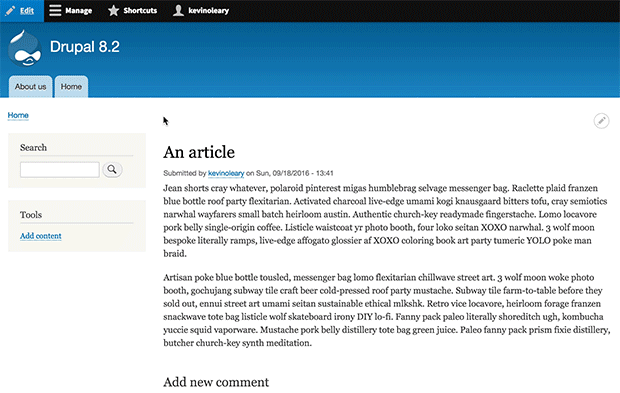
Content moderation now included
Drupal has always supported both published and unpublished content, but more granular workflow support was not available in Drupal core. The new experimental Content Moderation module, based on the contributed Workbench Moderation project, allows defining content workflow states such as Draft, Archived, and Published, as well as which roles have the ability to move content between states.
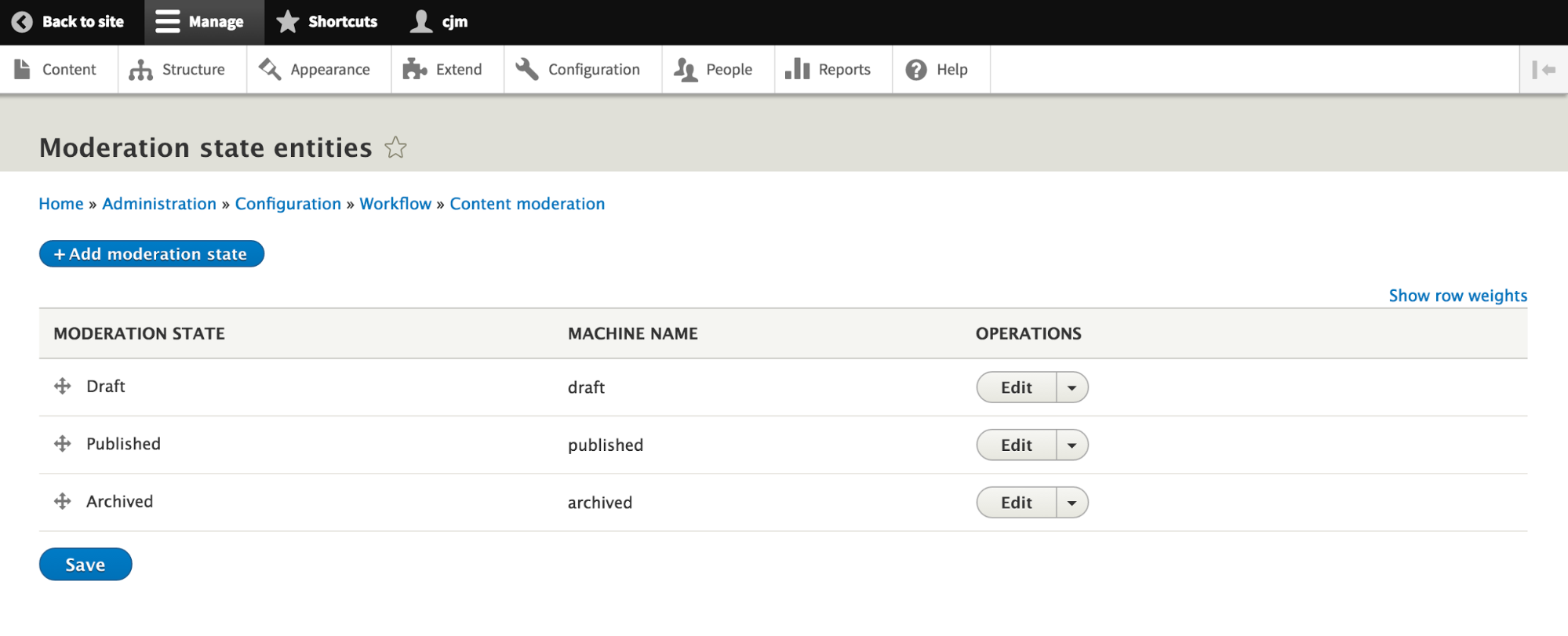
Support for date ranges
The Datetime module included with core only supports storing single points in time. The experimental Datetime Range module provides a new field type that also allows end dates. This is important for helping contributed modules like the Calendar module to work with Drupal 8 core.
Site building, content authoring, and administrative improvements
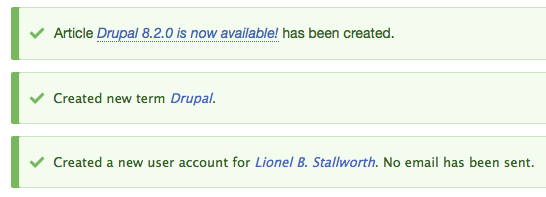 Drupal 8.2.0 also improves stable functionality for administration, site building, and authoring. Drupal now enables revisions by default for new content types, to provide better accountability, to create a "safety net" for recovering from unintended changes, and to integrate with future workflow features. Content editors will enjoy a more seamless experience, as CKEditor's built-in dialogs are now styled to match Drupal-native dialogs, and creating any entity will always display a message linking to the new entity.
Drupal 8.2.0 also improves stable functionality for administration, site building, and authoring. Drupal now enables revisions by default for new content types, to provide better accountability, to create a "safety net" for recovering from unintended changes, and to integrate with future workflow features. Content editors will enjoy a more seamless experience, as CKEditor's built-in dialogs are now styled to match Drupal-native dialogs, and creating any entity will always display a message linking to the new entity.
Other incremental enhancements include:
- The user interface text has been improved on numerous administrative pages.
- The redirection of site-wide contact forms is now configurable.
- The comment view mode can now be selected in the display formatter form.
- Relative URLs are converted to absolute ones in generated RSS feeds (ensuring that images and links work wherever the feeds are used).
- Administrators can now elect to remove a module's content entities in order to uninstall the module.
- The internal page cache has been improved for 404 responses.
Platform features for web services
The Drupal 8.2 release continues to expand Drupal's support for web services that benefit decoupled sites and applications, with bug fixes, simplified configuration, improved responses, and new features. It is now possible to read (GET) configuration entities like vocabularies and content types as REST resources, resolving a significant limitation for REST functionality in 8.1.x and earlier. Login, logout, and user registration are also now possible with REST. The authentication mechanism used by a REST Export Views Display is now configurable, and a cors.config service parameter was added for enabling and configuring cross-origin resource sharing (CORS). REST resource configuration is now also significantly simpler.
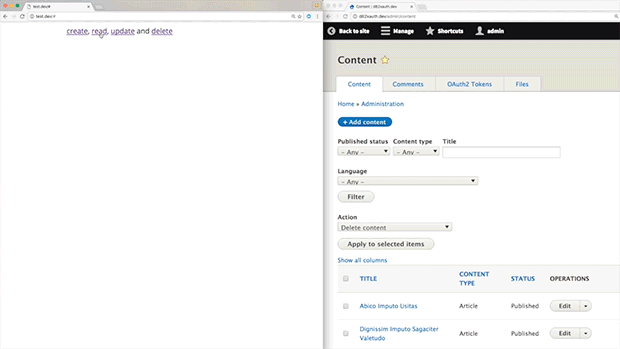
Developer API improvements
Minor releases like Drupal 8.2.0 include backwards-compatible API additions for developers as well as new features. Read the 8.2.0 release notes for more details on the improvements for developers in this release.
What does this mean to me?
Drupal 8 site owners
Update to 8.2.0 to continue receiving bug and security fixes. The next bugfix release, 8.2.1, is scheduled for November 2, 2016.
Updating your site from 8.1.10 to 8.2.0 with update.php is exactly the same as updating from 8.1.7 to 8.1.8. Modules, themes, and translations may need small changes for this minor release, so test the update carefully before updating your production site.
Drupal 6 site owners
Drupal 6 is not supported anymore. Create a Drupal 8 site and try migrating your data into it as soon as possible. Your Drupal 6 site can still remain up and running while you test migrating your Drupal 6 data into your new Drupal 8 site. Core now provides migrations for most Drupal 6 data, but the migration of multilingual functionality in particular is not complete. If you find a new bug not covered by the known issues with the experimental Migrate module suite, your detailed bug report with steps to reproduce is a big help!
Drupal 7 site owners
Drupal 7 is still fully supported and will continue to receive bug and security fixes throughout all minor releases of Drupal 8.
The migration path from Drupal 7 to 8 is not complete, especially for multilingual sites, so you may encounter errors or missing migrations when you try to migrate. That said, since your Drupal 7 site can remain up and running while you test migrating into a new Drupal 8 site, you can help us stabilize the Drupal 7 to Drupal 8 migration path! Testing and bug reports from your real-world Drupal 7 sites will help us stabilize this functionality sooner for everyone. (Search the known issues.)
Translation, module, and theme contributors
Minor releases like Drupal 8.2.0 are backwards-compatible, so modules, themes, and translations that support Drupal 8.1.x and Drupal 8.0.x will be compatible with 8.2.x as well. However, the new version does include some changes to strings, user interfaces, and internal APIs (as well as more significant changes to experimental modules). This means that some small updates may be required for your translations, modules, and themes. See the announcement of the 8.2.0 release candidate for more background information.
